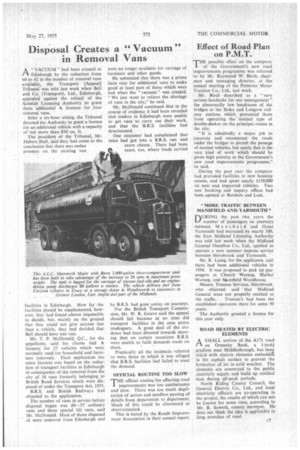Disposal Creates a "Vacuum" in Removal Vans
Page 47

If you've noticed an error in this article please click here to report it so we can fix it.
A" VACUUM " had been created in Edinburgh by the reduction from 60 to 42 in the number of removal vans available, the Transport [Appeal] Tribunal was told last week when Bell and Co. (Transport), Ltd., Edinburgh, appealed against the refusal of the Scottish Licensing Authority to grant them additional A licences for .four removal vans.
After a six-hour sitting, the Tribunal directed the Authority to grant a licence for an additional vehicle with a capacity of not more than 850 cu. ft.
The president of the Tribunal, Mr. Hubert.Hull, said they had come to the conclusion that there was undue pressure on the existing van facilities in Edinburgh. How far the facilities should be supplemented, however, they had found almost impossible to decide, but, mainly on the ground that they could not give anyone less than a vehicle, they had decided that Bell should have one van.
Mr. T. P. McDonald. Q.C., for the appellants, said his clients had A licences for 25 vehicles which were normally used for household and furniture removals. Their application for extra licences was based on the reduction of transport facilities in Edinburgh in consequence of the removal from the city of 18 vans formerly belonging to British Road Services which were disposed of under the Transport Act, 1953.
B.R.S. and British Railways had objected to the application.
The number of vans in service before disposal began was 60--57 ordinary vans and three special lift vans, said Mr. McDonald. Most of those disposed of were removed from Edinburgh and were no longer available for carriage of furniture and other goods.
He submitted that there was a prima facie case for additional vans to make good at least part of those which were lost when the " vacuum" was created.
We just want to relieve the shortage of vans in the city," he said.
Mr. McDonald continued that in the course of evidence it had been revealed that traders in Edinburgh were unable to get vans to carry out their work. and that the B.R.S. facilities had deteriorated.
One customer had complained that mice had got into a B.R.S. van and eaten cheese. There had been cases, too, where loads carried by B.R.S. had gone astray on journeys.
For the British Transport Commission, Mr. W. R. Grieve said the appeal should fail because at no time did transport facilities in the area prove inadequate. A great deal of the evidence had been directed towards showing that on certain occasions B.R.S. were unable to fulfil demands made on them.
Practically all the instances referred to were those in which it was alleged that B.R.S. facilities had failed to meet the demand.
OFFICIAL ROUTINE TOO SLOW
THE official routine for effecting road improvements was too cumbersome and slow, There was too much duplication of action and needless passing of details from department to department. Much of this Could be eliminated or short-circuited.
This is stated by the Roads Improvement Association in their annual report.








































































































